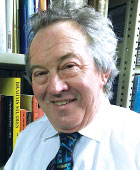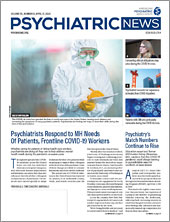Recently, a member of the clergy asked me about someone who reported being suicidal and what else could she do to help avert a suicide. After a couple of calls and feeling helped, she exclaimed in wonder: “How do you do it? How do you cope with this day by day?” I answered that we learn to do so by trying to find the “sweet spot” for handling stress.
Most psychiatrists have a stressful career. That is part and parcel of needing to be empathic and compassionate with every patient.
I may or may not have experienced more stress than usual. I always worked at least part time in community psychiatry, where resources were always inadequate. I once had a boss who was convicted of being part of a scheme to buy and sell our clinical buildings, destroying our system almost immediately and necessitating a career and geographical move for me and my family. I tried leading a not-for-profit academic managed care system to be a participant/observer but was publicly called “evil” by a professional leader who later apologized. I saw many patients with posttraumatic stress disorder, especially refugees and prisoners.
Actually, I thought that all of this stress could not only be handled but also resulted in more resilience and a sense of accomplishment. I loved being a psychiatrist.
I thought I would work to old age, but something seemed to change after the start of the new millennia, when for-profit managed care escalated. For instance, at my institution, medication visits were reduced from 30 to 20 minutes, then to 15, and finally to 10, and half of that was for electronic health record documentation. Administrators did not engage us in these decisions. I felt blocked and easily replaceable by a younger, cheaper psychiatrist. After reviewing my financial status when I turned 66, I quit.
Almost overnight I felt so much better and lighter emotionally. I wondered why. Talking about this to a retired emergency physician, Randall Levin, M.D., he said that I had been burned out. I was? This was in 2012, and I had never even heard of that term, yet it was a psychological one. He said that he had been burned out too and that his specialty was working on this unique variation of stress.
I wondered, Was psychiatry also touched by burnout? I had a new calling to find out why and to help our specialty use our expertise for other physicians and ourselves, as burning out gradually increased to an overall epidemic rate of 50%. The main cause? It’s a derivative of the 1992 Clinton presidential PR campaign: “It’s the economy stupid!” Now, it’s the system, stupid!
Our APA became more involved with this challenge under President Anita Everett, M.D. As part of a component she created—the Work Group on Physician Wellness and Burnout—I became a “poster child” of sorts for psychiatrist burnout with a brief personal video on our website. Perhaps, most importantly, I became a co-editor of the new book published by our APA Publishing, Combating Physician Burnout: A Guide for Psychiatrists.
I wish I could have seen that suicidal person, but I could still help. I am known as our local “community psychiatrist,” serving pro bono on boards, discussing movies, and addressing Islamophobia, anti-Semitism, and climate change.
Our ethical principles put the needs of colleagues and ourselves as secondary to that of patients. Maybe that should be turned around. Research suggests that if we are burning out—feeling emotionally exhausted, cynical, and/or less effective—patient outcomes suffer.
Even the current challenge of the coronavirus epidemic in mental health systems will not cause burnout despite increased workload and personal risk, but it will if physicians are blocked from doing what we can to heal under the circumstances.
My professional passion and fire have been reignited. I still love being a psychiatrist. ■
Editor’s note: With this article, Psychiatric News is launching a new column in which APA members are invited to share personal stories that taught them important lessons, gave them meaningful insights, changed their lives—in short, touched them in some way from which others might learn. Stories can be related to personal or professional experiences. If you are interested in sharing such a story, please contact Cathy Brown. 
